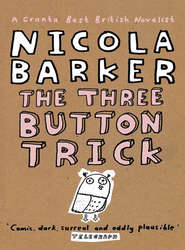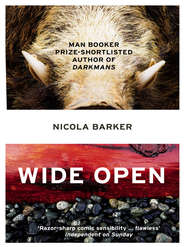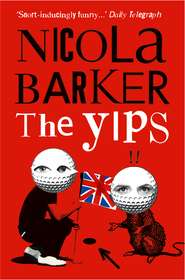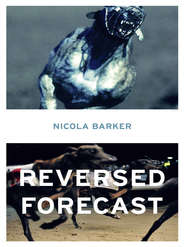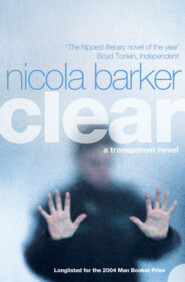По всем вопросам обращайтесь на: info@litportal.ru
(©) 2003-2024.
✖
Reversed Forecast / Small Holdings
Автор
Год написания книги
2018
Настройки чтения
Размер шрифта
Высота строк
Поля
Vincent glared at her. He looked like a red gargoyle. ‘I don’t need any favours from you.’
‘Suit yourself.’
She walked back around the counter and into the kitchen, where she moistened one of the cleaner tea-towels in hot water, wrung it out, then returned to the shop and threw it at him. Vincent caught the towel and sank his face into it. Jason had finished with the police and was now deep in conversation with his area manager.
When Vincent lifted his head from the towel, Ruby noted that his face was square-shaped, with generous features but smallish eyes. It was a Celtic face – pale skin, reddish-brown lashes, stubble and brows – but his accent wasn’t Irish or Scottish, only rough and vaguely rural. He was of medium build and stocky. Solid, she thought. And stupid. Like a ginger tom. She said, ‘Some of our other shops don’t have glass screens any more. Maybe you could go into one of those next time.’
He leaned up against the counter and appraised her. ‘I was supposed to be meeting someone in here this morning, but I fell over him outside. He was lying in a pile of old fruit and cardboard. They told me on the stalls that you’d thrown him out.’
I didn’t even do it, she thought; only let it happen.
‘I didn’t do it. Someone else did,’ she said.
He blotted the towel against his forehead. ‘Did you bother to take his pulse? Did you check he wasn’t having a fit?’
Her eyes widened. ‘He wasn’t, was he?’
Vincent smiled. ‘Who’s to say?’
‘He wasn’t, was he?’
‘Fuck you.’
The police arrived, pushed through the door and strolled in.
Ruby held out her hand to Vincent. ‘My name’s Ruby. I’ll try to explain things if you like.’
Vincent slapped the damp, bloodied tea-towel down on her outstretched palm and said calmly, ‘You’ll pay for this.’
She backed off but was not afraid. She was tough enough. He was shorter than her by a couple of inches.
Oh yeah, she thought, walking back into the kitchen to make some more tea. Just another bad dream.
He left cuffed, but quietly.
Two (#ulink_47d98c6a-206e-57c2-8da6-ff045bac387a)
When younger, Sylvia had been something of a diversion, a novelty, an idiosyncracy – eccentric but endearing. Now she’s just a problem. And she knows it. She knows it well, but she doesn’t care.
The general consensus on talent is that it is something that everybody appreciates, something that people want to share. Talent is just another commodity. No matter how obscure the talent may be, it’s powerful, it’s positive, it’s something good.
Sylvia is nineteen. She thinks that she understands most things, and the things she doesn’t understand she knows are of no interest to her. When she was fifteen she looked up the word ‘talent’ in her dictionary and saw that its origin was in the Greek talanton. The rough definition of this particular word was ‘a weight’.
Talent, she decided, isn’t always a good thing. It can’t be. She pictured it as a weight around her neck, something heavy, choking and burdensome. She remembered Bette Davis in Whatever Happened to Baby Jane?
Sylvia is very ill, and it’s all because of the birds. She suffers from a rare condition known as Bird Fanciers’ Lung. This condition is caused by excessive contact with birds, their feathers and their dirt. Eventually you get allergic. Eventually it can kill you.
The first time Sylvia suffered symptoms of this rare disease was at the age of thirteen.
The birds had always loved her, she was always the apple of their beady eyes, but when she reached puberty (she reached it late and never seemed to get over the shock) the birds just couldn’t resist her. She became a magnet for their tiny, fragile, feathery bodies. They simply couldn’t bear to keep away.
And Sylvia grew to love them.
Her relationship with the birds isn’t a silly or a dramatic one. She can’t talk ‘bird’ for example; she certainly isn’t a Dr Dolittle.
This makes her talent somewhat redundant. She can’t put on a show with the birds – a circus show or a freak show. It is simply that they love her and she has grown to love them. Possibly the attraction is just hormonal – hormones are complex things – but possibly not.
Steven John had wasted a good part of the morning driving up and down Mare Street, Hackney, trying to locate the relevant turn off for Jubilee Road. He didn’t know the area well and his sense of direction was abysmal. He’d tried perusing an old, dogeared copy of the A to Z, but had been unable to work out which way up to hold it, which was left and which was right. Eventually he had managed, through sheer coincidence, to find the right road, the correct building and a handy parking space. The space, he thought; that at least must be a good omen.
Before getting out of his car he straightened his lapels and adjusted his collar.
He looked smart. His clothes were always of a high quality – hand cut – but slightly loud. He had a problem with colour. His suits were invariably too beige or too blue or too black. He usually wore a tie, a silk tie, and today was no exception. Peeking out from the inside pocket of his jacket was a gold-plated Parker pen and matching pencil. He found some difficulty in forming the letters correctly in real ink but preferred the classic charm of an ink pen to the bald, cheap brashness of its modern-day equivalent, the Biro. Biros, in his book, had no style and no class.
Steven John has always believed that the little things in life count. Sometimes he thinks that they count more than the big things. This small, almost mediocre philosophy of life is part of the reason why, in his own eyes, he has always been such an absolute failure. He feels insecure, lacks confidence and is devoid of panache. Even his name – this cuts him to the quick – is like two Christian names jammed gracelessly together. Of course it’s a name that could easily be imagined on the front page of Variety magazine. The kind of name someone on the cabaret circuit might have. The kind of someone who makes a break in the chorus of a West End musical. Probably homosexual.
It was as a consequence of his belief in the importance of detail that Steven resolved, at an early age, to gravitate towards the world of showbiz management. He was not made of the stuff of stardom, he knew this full well, but he was a pretender, a trier, a people person.
He sees himself as a fighter, an endurer, someone who battles manfully against all odds. The fact that he battles, suffers and invariably loses is incidental. He makes a living. Some people, he often thinks, correctly, can’t even do that.
He entered the block of flats and, on discovering no lifts, began to climb the stairs. On reaching the third floor he became aware of a strong, musty flavour in the atmosphere – a smell akin to damp, but stronger. The brickwork was newly painted and the hallways seemed clean and well maintained. He put a hand to his throat and wished he was fitter, that his lean body was more athletic, so he wouldn’t be compelled to breathe in this nastiness so deeply, so completely. He cleared his throat, although this didn’t help matters, then continued his ascent.
The smell grew stronger as he reached the fifth floor. Restraining an impulse to sneeze, he raised his fist and rapped gently on the door of the top flat, which was painted a bright, fresh evergreen.
Within seconds the door was pulled open and Steven beheld Samantha, who was looking absolutely radiant and whose first response to his restrained nod of greeting was to smile and say, ‘We thought you’d gone and stood us up.’
She took hold of his hand and shook it. Steven appreciated this small touch.
‘Come in, we’re just having breakfast. We were waiting for you, but it got so late we’ve already started.’
Her face was like a punch, a slap. She was so perfect that it set his teeth on edge. Like a madonna, a princess. Radiating something – an inexplicable serenity – from her black hair and her black eyes. Everything about her just so. A terrifying neatness, a rightness. Her lips, a cupid’s bow; her lashes, so long that he could have plucked them and used them to string a viola.
He forgot to say anything. He could have apologized for his lateness, but he found it impossible to contain anything else in his mind during that instant but her face – the glow of her. Words melted and turned into honey.
She led him through the flat. He followed, still numbed by her. If you had a relationship with a girl like this, he thought, you’d spend all your time trying to find some one thing wrong with her, and when you found it you’d be devastated.
Sam turned to say something to Steven as she led him along the corridor, and caught him staring at her bottom. She forgave him his indiscretion immediately, expecting no better than this from your average man. Steven blushed and continued to stumble down the corridor behind her, keeping his eyes to himself.
The flat was bright, clean and well decorated, but it stank. Steven couldn’t understand the smell. He was momentarily worried that the smell might be his fault, and furtively checked the base of his shoes before following Sam into the kitchen.
The kitchen was painted a meticulous white and filled with red utensils. Sitting at a large red table in the centre of the room was Sam’s mother, Brera, who was thirty-eight, had long auburn hair, fine features and slightly jutting teeth. She beckoned Steven towards the table without standing up. He found her grandly matriarchal.
The table was set with butter, jam, percolated coffee and a half-eaten plate of hot croissants. Steven noticed four settings and hesitated over where to sit. ‘You’ve not gone to all this trouble on my account?’
Sam sat down on the chair to his left. ‘Of course we have.’
She picked up a croissant and ripped it in two with her fingers. Steven sat down and nervously unfolded his napkin.
Brera poured him a cup of coffee. ‘You’re over an hour late, which is hardly an auspicious start.’






